| |
"Folk horror, like film noir, is a term that seems to have been first used by critics before film-makers themselves, but The Wicker Man is so much better and more distinctive than any film that comes under the folk-horror heading that it's virtually a one-movie genre in itself." |
| |
Peter Bradshaw, The Guardian, 21 June 2023* |
| |
| |
"Watch it today and the uncanniness remains spellbinding. It's not just that it's horrifying – though the climax certainly is – but that every minute of the running time is steeped in a liminal weirdness." |
| |
Ed Power, The Independent, 15 September 2020** |
Director Robin Hardy and screenwriter Anthony Shaffer's 1973 folk horror masterpiece The Wicker Man is unique in the respect that it is the first film to be reviewed in three separate home media incarnations here at Cine Outsider. In 2006, Lord Summerisle – whose moniker is taken from the character played by Christopher Lee in the film – examined Optimum's three-disc Collector's Edition DVD, and in 2013, Camus took a more detailed dive into the film for Studiocanal's 'Final Cut' Blu-ray release. Now, Studiocanal is releasing the film on UHD in a new 4K restoration, and it falls to me to take a third look at the film. Except…
The simple truth is that so much ground was covered so eloquently and passionately in the previous two reviews that, while I could indeed provide my own take on what remains a favourite film, the crossover with the previous writings would likely be substantial, and I'm already well behind on other reviews and have more still lined up for release next week. When it comes to this film, I'm thus going to defer to Camus and his detailed coverage of it for on its previous Blu-ray Final Cut incarnation, a review that has been reposted below and updated in order to be more specific to this release. After this, I'll be talking looking at restoration and the UHD transfer and providing a final summary of the release overall. When it comes to the special features the duties will be shared, with Camus's original assessments of the ones carried over from the previous release supplemented with my own words on those that are new to this 50th Anniversary Special Edition. Just who wrote what in this section will be identified in italics immediately after the title and running time of each. I have included the Robin Hardy quote from Camus's original review, as he refers directly to in his opening paragraph, but have omitted the original link to the source at grolschfilmworks.com, as the site appears to have been since taken down. I should also note that the 50th Anniversary Special Edition includes five discs, with the three cuts of the film and the special features spread out over two discs and presented on both UHD and Blu-ray, and a fifth audio disc containing songs from the film, plus posters, postcards and a booklet. Only the two UHD discs were supplied for review.
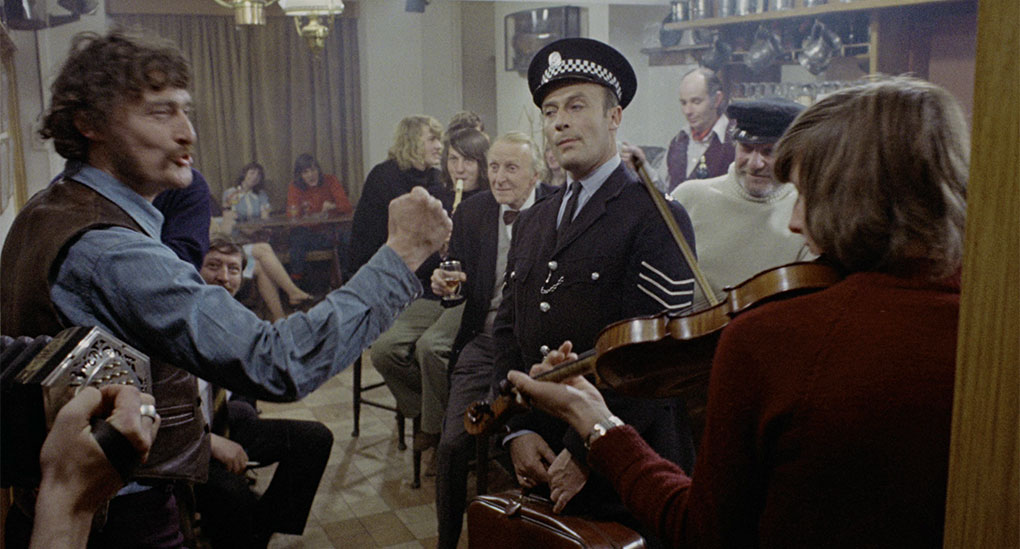
I will note here that the film still astonishes for all of the reasons identified below, and I still recall my first viewing many years ago and the genuine, punch-in-the-gullet shock I got when the true meaning of that title was revealed. There aren't many things that existentially scared me when I was in my teens, but this one knocked me for six. Only with (many) subsequent viewings did I get to appreciate how beautifully spun the tale leading up to this point is, and how smartly constructed the deception was that saw a detective story transform into a horror-themed conspiracy thriller. Watching it again I was also reminded just how potent its subtext is – we're not just talking the blindness of religious fundamentalism here, but the frustrations and risks of non-conformity, and the danger of blindly following and believing every word spoken by an enigmatic cult leader. There's even a topical message here about the potentially destructive nature of the populism that is increasingly corrupting politics worldwide. And yet conversely, there's a little part of me that rather fancies spending my retirement on Summerisle and becoming part of what is effectively an isolated hippie commune. Oh yes, there are rich pickings aplenty here.
As an aside, one of the most treasured DVDs in my collection is a Special Edition of the film released in America by Anchor Bay, one whose case is a metal-latched wooden box with the title and that now iconic image of the Wicker Man printed on the outside in a manner designed to make it look as if it's been burnt on. It's a rather lovely looking thing whose presentation is somewhat undercut when you open the box to find the disc wedged into a piece of clear preformed plastic.
Over to you, Camus...
| |
"It's a black comedy... We got this wonderful headline review very early on: 'The Citizen Kane of horror movies'. You couldn't disown a review like that because of the 'Citizen Kane' part. We became stuck with the 'horror film' tag." |
| |
Director Robin Hardy |
If it is indeed a black comedy, it's perhaps one so judged with decades-long retrospection. For those few of you unfamiliar with the film, a brief synopsis. It's 1973 and a devoutly Christian policeman, Sergeant Howie (Edward Woodward) flies to the island of Summerisle off the west coast of Scotland. He has received word that a girl is missing. He gets very little cooperation from the locals and finds himself repelled by their odd behaviour, driven as they are by pagan practises of ancient Wiccan origin (which means a fair amount of female nudity, quelle surprise). Howie's own beliefs allow only dismay and disgust at these goings-on. He meets the leader of the island, Lord Summerisle (Christopher Lee in what the venerable actor regards as the best role of his long career) and it's fair to say the two men agree to differ when it comes to religious matters. Unsatisfied with Summerisle's 'fruit of the loony' arguments, Howie desperately attempts to find the missing girl before something horrific can happen to her. If you really don't know how this movie ends then I'm not going to spoil anything for you, though during my review there may be a few inadvertent slips. That said, like later DVD and Blu-ray editions of Close Encounters that placed its key surprise on the disc inlay cover (d'oh!), The Wicker Man's marketing material has rather diluted what may be something all the more powerful if you come to it as Howie does – innocently and unsuspecting. OK, the movie title's a tiny bit of a giveaway and if I were marketing the film, it'd be the image I'd go for too but subtlety needn't be anathema to advertising. Director Robin Hardy was at a loss regarding the original British Lion 'in your face' campaign. He said "It's like doing a poster for Psycho that tells you that Norman's mother is 'blank' himself!" That's for any Psycho virgins out there.
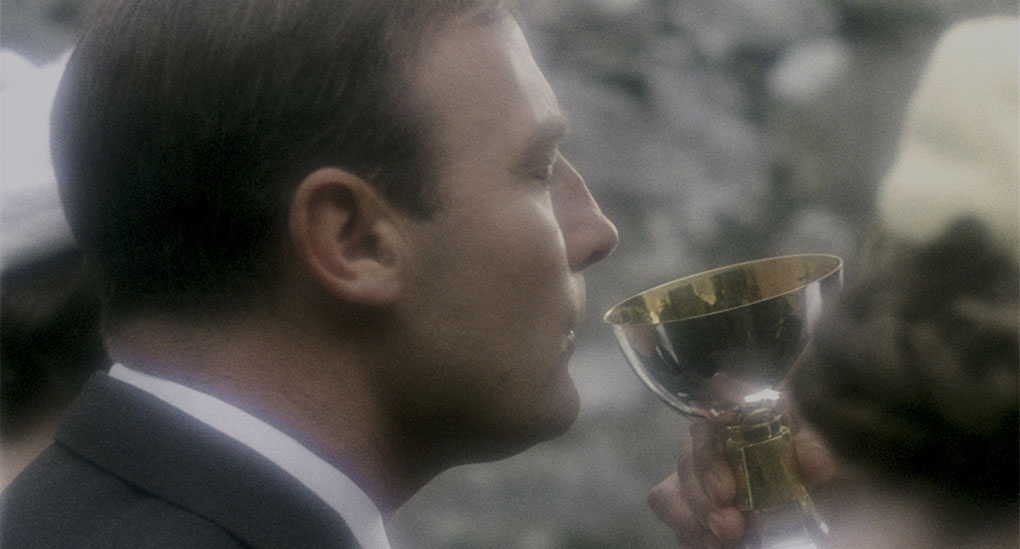
So looking back over fifty years... Characters like Sergeant Howie are not as prevalent today as they were in 1973 (or if they are, they are keeping quiet about it). Extreme religious views have not left our species (more's the pity) but in the UK, five decades on, Howie is almost a caricature absolutely steadfast in his Christian faith. I've no census-based statistical proof but I would say resolute, practising religious die-hards (at least home grown) are on the decline. I'm not so sure about there being a decline in other religious extremism... Howie entertains no other beliefs except his own and you have to ask him, "How's that working out for you, Sergeant?" I have another argument for suggesting that the passing of time may be an element in the confirmation of the so-called Final Cut. It's not the longest of the three cuts presented here (previously released, confusingly, as The Director's Cut) which may surprise some. The principal lopped off chunk is the original opening that sets up more instances of Howie's character doing his police duties, a virgin, a real Ned Flanders, not well liked but perhaps a tad more respected than he will be on Summerisle. Dramatically, these scenes are not missed at all however exciting it is to see more scenes of a beloved movie. To us Wickaficianadoes, it's footage we've seen before from a rather thin videotape source, the only one available at the time of a previous DVD release, the Studiocanal 2002 Double Disc Edition. But whereas that one trumpeted The Director's Cut simply by dint of the addition of lost material, we're now being told that the real Robin Hardy approved Final Cut is the one that the director has eventually signed off on (losing the original police work opening). I guess what was then forty years allows you a long time to re-evaluate your work. Pacing and the slow drip revelation of mystery have developed a little more since the seventies, and to have Howie's innocence and adherence to God rammed home more than three times may rob the conclusion its delicious if horrifying taste. Times and minds change. However, Hardy's volte face may smell of a canny marketing strategy (as it's been mooted) but then marketing has only one goal and it's not a successful crop of apples. True Wicker fans know that the previous Blu-ray – and by extension this new UHD – may have a directorial stamp of approval, but it's the really missing scenes that still hold the allure, the ones believed consigned to the dustbins (and the foundations of a motorway, the frankly silly idea the trims and unseen material were made part of the M3 being built at the time of the film's post production). To find out more about these scenes (which this release does not feature because they really are 'lost'), see the next paragraph. I take the so-called 'Wicker Man conspiracy' head on in a final few paragraphs before the summary.
I must acknowledge three tremendously detailed and bounteous sources of information on the movie, a collective Wickerpedia if you like. Firstly there is the 1977 Volume 6 Number 3 print edition of the once great genre magazine Cinefantastique chock full of Wicker Man coverage. The advantage of this piece of journalism is that it's more immediately relevant to the time period in which the film was made and released. Secondly there's the 2000 book 'Inside The Wicker Man: The Morbid Ingenuities' by journalist Allan Brown. His no-prisoners style of writing is refreshing. I quote; "Every effort (well, some effort) has been made to iron out conflicting accounts..." and my favourite, "It is almost 28 years since the film went into production and the memories of those who participated cannot be expected to be faultless. So if flaws are found, please direct all complaints to the relevant actors or production staff; most of them are in the phone book." Priceless.
The third and most detailed source is a terrific web site run by Steve Phillips – http://www.steve-p.org/wm/. Give that a click and you'll have at your fingertips detailed breakdowns of the different versions, an extraordinary level of information about what was shot but never made it to the light of a projector lamp via on set photographs and script excerpts. It's a veritable gold mine and I am indebted to Steve's efforts not because we at Outsider are lazy with the coverage (!) but why recreate what has already been done superbly well in significantly more detail than even our reviews can usually feature. Bravo Steve.
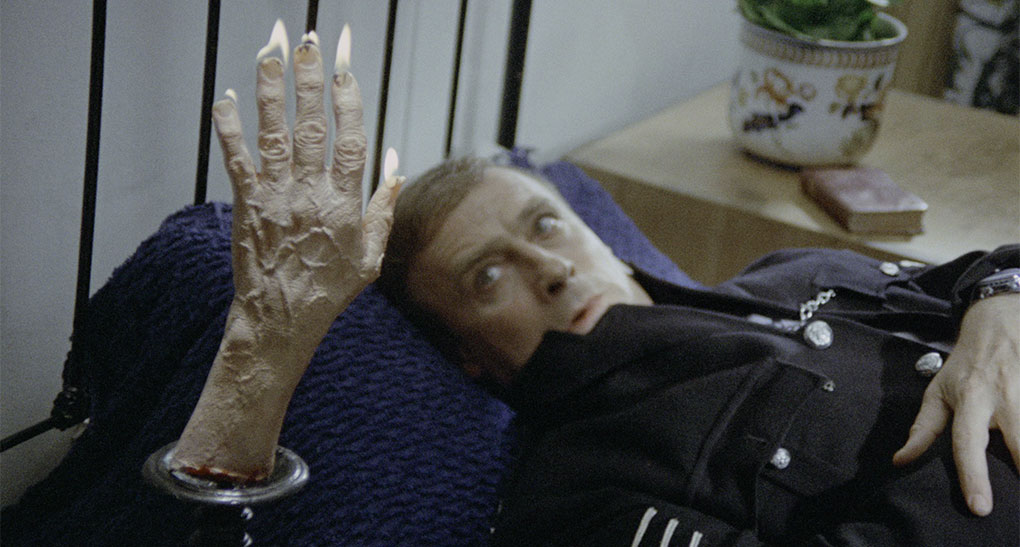
It was the now defunct print edition of the afore mentioned film magazine, Cinefantastique, which started the US critical wave of support for this extraordinary little film way back in the year Star Wars was born ('77). Before the term 'spoiler' had entered the cultural lexicon, the magazine said of the movie in a sidebar that... "Its surface is a thoroughly engaging mystery, topped off with a chilling, surprise ending." It seems extraordinary to me that this 'surprise ending' is given away twice in the first two pages of the magazine's exhaustive coverage of the film and many times elsewhere in the article. But then we have to remember that we are talking about a magazine that (horror upon horror) gave away that Darth Vader was rumoured to be Luke Skywalker's father before the release of The Empire Strikes Back. Ouch. The Wicker Man's history has been a tortuous one, passing from one distributor to another and trimmed as per the commercial demands of its prospective target demographic and where available money allowed work upon it. As the post production story's twists and turns spun out of the control of any one reliable and objective witness, we have to make do with a welter of opinions, hearsay and skewed-remembered tales. Author Allan Brown's book on this part of the film's history is fascinating because it beggars belief that so many individuals, companies and deals were involved with what must have seemed like a modest thriller/horror film. To quote Brown, it was "a horror tale written by a copyright lawyer." To be honest none of the myriad stories of the fate of Hardy's classic hold a relevant candle to the experience of actually sitting down and watching the film. Aficionados can holler all they like for the original short version, the longer version and the middle version but truth be told, once you see whichever version, that is your Wicker Man. I cannot even tell you which version I first saw which disturbed me so much (very likely the shortest, theatrical version). It's not as if the climax is missing from any of the three versions and the climax is to The Wicker Man as laurels are to Hardy.
All of this speculative dancing around so many versions seems to miss the point. What is more horrifying, psychologically, than being one among a majority of people whose beliefs are almost the antitheses of your own? In a simplified example, imagine coming across two hundred people in a small village all of whom believed without doubt or pause for thought that one and one equalled three. You stand there almost smiling with disbelief. "But one and one equals two," you'd say. The majority would smile at your deluded belief and suddenly you'd be instantly enlightened. Truth and reality are not a constant that can be relied upon when human beings are in the mix as they inevitably are. And when what people really believe is a matter of life or death then beliefs take on horrific weight and act like levers when pulled changing everything (thanks to Sam Harris for that razor sharp metaphor). You may think Orwell's doublethink is just another form of cognitive dissonance but holding tightly on to a belief can be as dangerous as granting power to those whose beliefs contradict yours. Ever been in an argument when you felt yourself in such an unassailable position, you would have bet your own arm you were right? Ever seen what happens to people in that position when they are constantly contradicted (the so-called truth can be irrelevant by the way)? In my experience, I've seen people almost collapse with the tension generated by such an argument. Let's assume Howie would never come around to a pagan point of view and Summerisle and the islanders had no intention of giving up their sexual freedoms, their way of life and their own pagan gods for the hugely constraining single deity, Yahweh. That Old Testament relic is about as valid to Summerisle as Poseidon is to Howie. People (that's you and I) will do almost anything to be right. Over time, those martyrs that have given their lives to maintain their righteousness have inched human society both forward and backward towards and away from civilisation. Remember, if you believe as Howie believes, you accept that a ghost impregnated your saviour's mother. Written down it all seems somewhat childish never mind ridiculous. One and one equals...? You sure?
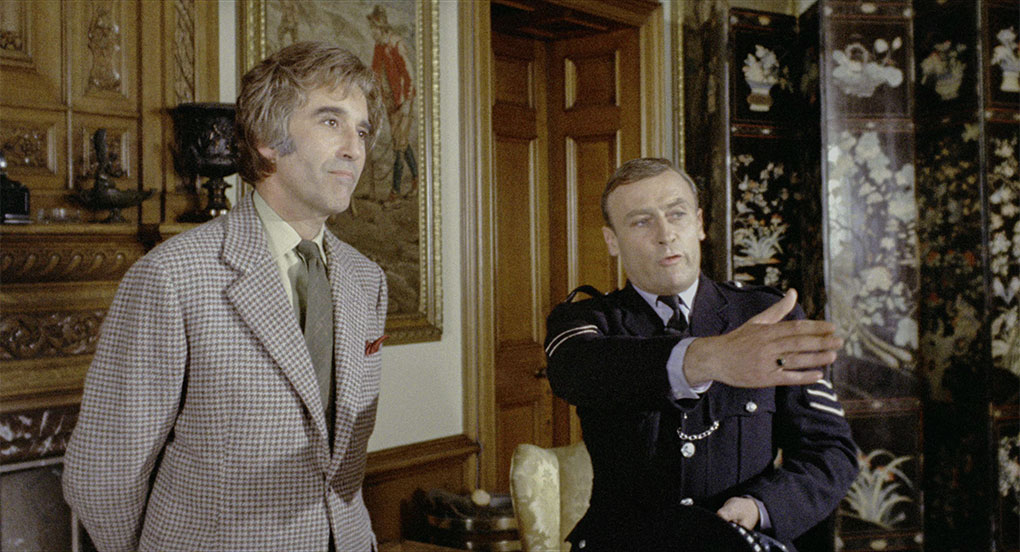
The performances in the film are top notch. Lee's own judgement of his contribution is spot on. He plays Summerisle as a man comfortable with his own needs and desires. His self-belief is so easily entrenched that I have to pinch myself watching the film to remind me that both Howie and Summerisle are completely bonkers, both men of God and gods and both anchored to an irrationality that still dazzles me in its utter preposterousness. But while Howie is not at all relaxed in his beliefs and has them tested more than once on the island, Summerisle comes out as the reasonable one, the man of calm detachment in the face of Howie's staunch Christianity. The three main female parts (better hurry up and finish this sentence...) are played by three diverse actresses; Diane Cilento (an Australian) as the schoolteacher bemused by straitlaced Howie; Britt Ekland (Swedish) as the seductive landlord's daughter, Willow; and Ingrid Pitt (Polish) as the librarian often described in written material on the film as a nymphomaniac. That's a bit harsh as there's no direct suggestion in the film that she's the 70s version of a nymphomaniac – a woman who craved sex and indulged often – but Pitt was quite happy with the role ("everybody just loves you to bits because they see you in the raw..."). How a secluded island off the west coast of Scotland became home to such dazzling but geographically diverse beauties is beyond logic and is anyone's guess. But as a triumvirate of women who wear their sexuality right out in front for all to see, you'd have to work hard to come up with three more suitable actresses. They are all superb in their roles. They make me believe completely in their characters with a special nod to Ekland who does sound like she was dubbed but we are assured that her terrific Scottish accent is her own. She was apparently only doubled in her singing voice and her nude scenes from behind (therein lies a tale but I'll let the Special features fill you in on that). That info is from director Hardy's recollections in the commentary but Ekland herself says (in the documentary Burnt Offering) that she was dubbed in her speaking parts as well. Like the actual Wicker Man, debate on these issues rages on.
But it is Edward Woodward as Sergeant Howie who excels and whose frustration and anguish is about as convincing as any I've seen in a movie. We are invited to see the world through his eyes and sensibilities and yet, we quickly feel he is as much an outsider as he considers the islanders to be. His uniform in the film was made to be just a tad smaller than Woodward's size so in the bulk of the film, he's straining and barely contained. It reminded me of John Lithgow's confession to his son Liam Neeson in Kinsey. It's ridiculous religious belief wanting control over sexuality that in essence is like asking a disturbed dog not to bark. But without revealing the climax, it is here where Woodward excels. His anguish and fear is so perfectly conveyed, it's that simple exhortation of "Jesus Christ!" that is the most powerful moment of the film for me.
Technically The Wicker Man in all its incarnations has its ups and downs. It is very assuredly directed by first-timer Robin Hardy. Shot by old guard cinematographer Harry Waxman, the film has a summer sheen despite the winter truth of the shoot. He had a hell of a job on his hands plastering bare trees with fake blossom but none of this detracts. The final scenes still have a horrible intensity to them but I'm putting that aspect almost squarely on the finely judged performance of Edward Woodward. Waxman's next film, just for the record, was Digby, The Biggest Dog In The World. Hmm. I'm much more interested in a movie he shot in 1961, the brilliant The Day The Earth Caught Fire. What I am naturally more curious about is the mind-set and the technical achievement of the editor, Eric Boyd-Perkins. He cut three episodes of the original Prisoner TV series including my favourite, Fall Out, so that's a huge recommendation right there. I would imagine compared to a burnt out Patrick McGoohan, Hardy was a pussycat. Some of his work in the film is first class. It's interesting that he was also given the power to edit the film down without the producer and director's consent. A company man? But then I see a dissolve from a shot of a girl singing on a pavement to a wider shot of the same girl and I ask myself "Why add a mix there?" It's at 57 minutes and 5 seconds in to the Final Cut.
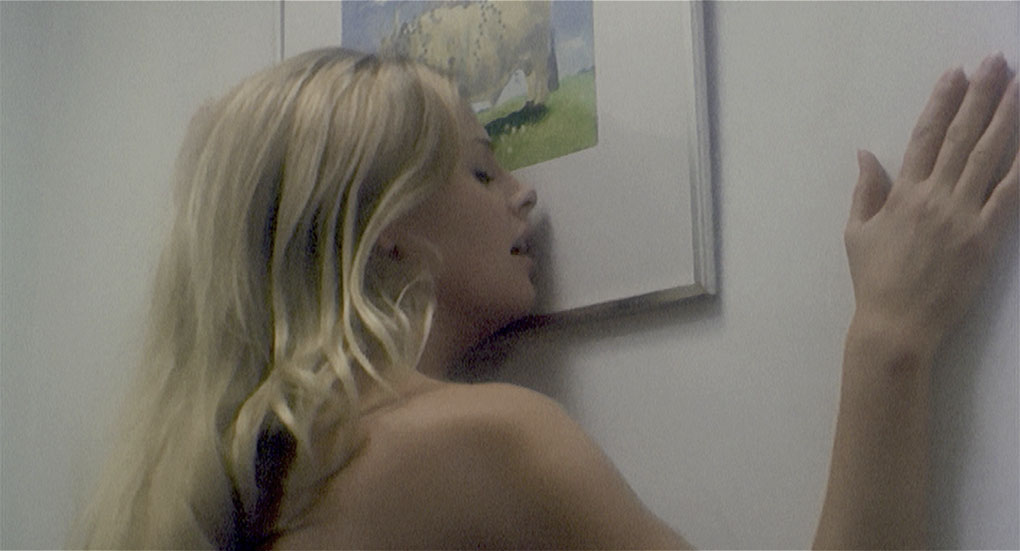
There are also small edits dotted about all three versions where different shots have been chosen, some which really stand out. The most obvious to me is the bizarre shot of landlord MacGregor straining at his ropes after being knocked out and tied up by Howie. This shot is in the Director's Cut only (at 1 hour, 19 minutes and 15 seconds) and seems to be an outtake as the shot features what we must assume is Howie's arm coming in from the left while the camera tilts down and to the right which is surely operator error or an after 'Cut!' wind down. The equivalent shot in both other versions is perfectly valid (MacGregor looking toward the door for help). Of course Boyd-Perkins may have had nothing to do with these odd anomalies, the film being passed through so many scissored hands. Fresh from the superlative work he did on the film, composer and overall music post-production supervisor Paul Giovanni is very damning of Boyd-Perkins' contributions to The Wicker Man. In Cinefantastique, he says of his time working with him "There were things in there that Perkins hated – I mean he used to get red in the face and say "That's disgusting!"... ...he never understood what it was about or how it should work as an accumulation of details. He was a real jerk-off, a very dull man." Don't sugar coat it Paul! All these opinions may have some basis in actuality but it's clear to me that unless Boyd-Perkins was spoon-fed by Hardy throughout the cut, his work on The Wicker Man is mostly excellent. Boyd-Perkins' own answer to this as quoted in Allan Brown's book is succinct; "I didn't object to any of it. Giovanni must have repeated things he heard me say which were taken out of context. He didn't understand how you talk in a cutting room." I can verify from long experience that an editor's relationship with the film he or she is cutting is a profound and unusual one. You have to spend time to pick up on the humour and the irony. For a start you become intimate with actors' movements and faces which is why editors always have a head start introducing themselves to the stars of the film. Without their knowing, we have become quite close to them. Yes, I know how creepy that sounds but it's no less true because of it.
The Final Cut should, by all accounts, be the Director's Cut. It isn't. But then again, it is. Robin Hardy was seventy-two when he performed the December 2001 commentary on the Director's Cut with Christopher Lee, Edward Woodward and Mark Kermode officiating. The heady rush of relief that something of his original cut had survived must have been intoxicating to him. He was eighty-three when the Director's Cut was suddenly usurped by a more recently found print of the movie for US distribution. For the specifics of the differences between the cuts, I urge you to visit Steve's web site mentioned earlier. His marvellous work includes a very handy PDF document comparing all three versions.
The Final Cut (that is until Christopher Lee's lost cans of negative are unearthed) works a treat. We don't miss Sergeant Howie's policing at all but the inclusion of his church going (with director Hardy officiating the service) is, I think, an important creative reinstatement. It's enough to define the policeman without being blunted by the truncheon of Howie's further adherence to the Lord. The further reinstatement of the second night is also important letting the events on the island sink in to and poison Howie more gradually. It also allows Willow's song to breathe. It's a superbly performed, directed and edited sequence not to mention damned erotic with enough phallic symbols to satiate Freud's estranged brother-in-law, Dick Randy. It now has the power it was designed to have instead of rushing through it on Howie's first night, as in the cut down version in the UK Theatrical Cut. The one thing I do miss is the tongue-in-cheek caption at the start of both other versions thanking Lord Summerisle for his help in the production of the film. Sly, but in hindsight, very funny.
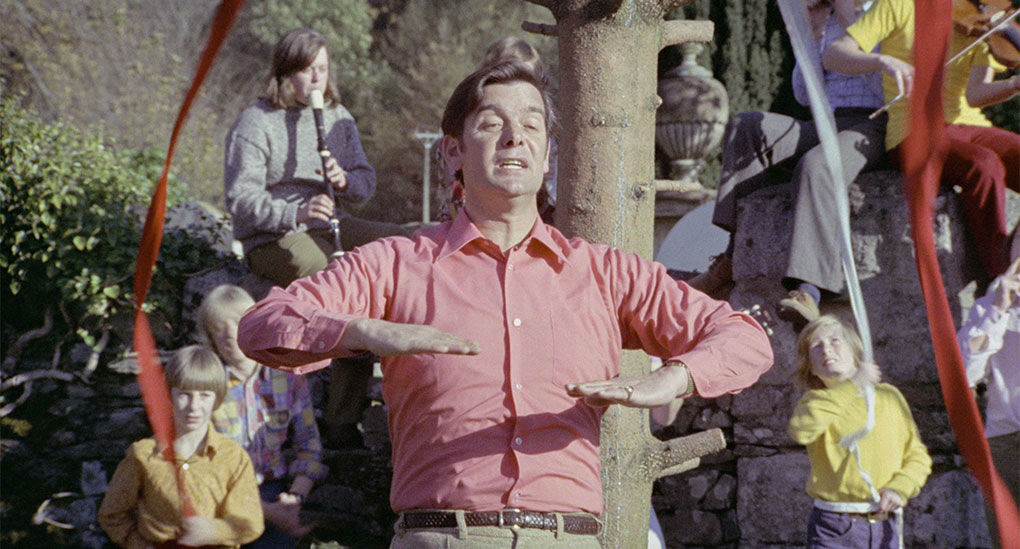
Not included in the review package is an audio disc of songs from the film may or may not be the CD of the original motion picture soundtrack. Paul Giovanni's work on The Wicker Man is extraordinary in the sense of its originality despite its being based around old folk songs and many versioned lyrics from all sorts of sources. Giovanni's score gives the film a real sense of peculiarity and island-solidarity. There's not been a film score quite like The Wicker Man and although I'm a fan, but unlike Eli Roth, it's not an album I can listen to with joy in my heart as it is so palpably entwined with the effect of the film. On the stand-alone soundtrack CD there are some dialogue samples scattered throughout, not a practise I'm supportive of generally but they are subtle and fleeting. The odd thing is the order of the cues and the placement of some dialogue samples. I'm sure it's designed as an album to be listened to in its own right but I never understand why soundtracks have to have the order in which they appear in the film shunted around. But then I am not a composer. The one cue that dates the film and is frankly wrong in the movie is the sub-Santana electric guitar piece that accompanies Howie and Rowan as they run through the cave just before the climax. I'm wondering how it survived the creative process because nothing would have been much more effective there. It doesn't surprise me that it's not on the official album that I own. Someone, somewhere is disowning this cue.
| a side note on The Wicker Man conspiracy |
|
Michael Deeley, who took over British Lion at the time of The Wicker Man's post-production, is often painted as the 'suit' that screwed up the film by agreeing to cut it down to a supporting feature length to get it into UK cinemas. His argument, business-wise, is a fair one. In his memoir 'Blade Runners, Deer Hunters, and Blowing The Bloody Doors Off: My Life In Cult Movies' (that title could do with a little editing down) he says "...the point of making movies is to get people to see them and to pay money at the door for that privilege. As it turned out, the running time for which Robin Hardy wished was not suitable to our sole commercial option, and at British Lion we made films for a commercial purpose." It's the business verses art argument again, an often insoluble one but one where commerce is usually victorious. What Deeley neatly sidesteps in his own book is the very real mystery of how the single most important asset of any film production (its negative) came to be lost and presumed landfill. In my experience, even negative in the more ephemeral world of past TV production was stored for a fixed time until the finished programme was judged to be the sole creation from that negative. Only then was it destroyed. A 35mm feature film's negative trims would not disappear that quickly unless someone had screwed up or caused their disappearance on purpose. Deeley alludes to the Christopher Lee Conspiracy Theory and the M3 landfill story but then closes the paragraph and never puts forward his view on how the film's original negative went missing. This, on its own, is proof of nothing but it still fascinates me.
The film went into production with an unspoken (and crucially unwritten) agreement that it would be picked up by Rank, one of the two majors in British Film Distribution in the 70s. The man atop of that mighty organisation was George Pinches whose partner at the time was the Hammer film regular and one of my first movie crushes, Ingrid Pitt. Pitt's presence in The Wicker Man wrongly assured the filmmakers that the movie would get picked up. Yes but... Producer Peter Snell had an on location fling with Pitt (far from home film crews can be rife with infidelities) and it's rumoured that George Pinches found out and scuppered the film's distribution chances. Speculation perhaps but like the behaviour of politicians, it shows how fickle, spiteful and basically human people can be in the film or any industry.
Let's kick this off by quoting Studiocanal's own press release about restoration on this UHD release, which applies to the Theatrical Cut and the vast majority of the Director's Cut and the Final Cut. This text also appears at the front end of the Director's Cut and the Final Cut when you play them on this UHD:
The restoration was scanned in 4K by Silver Salt Restoration UK, from the original 35mm negative. A second generation 35mm intermediate positive produced in 1973 was used to replace a small section with unrepairable damage in the original negative. Colour grading and restoration were completed by Silver Salt Restoration UK who dedicated over 500 hours to fix physical damage to the 35mm negative, manually clean and remove dirt, sparkle and scratches. The colour grade used was previously approved by Robin Hardy and replicated here.
When you play the Final Cut, the following text is also included:
The additional footage is sourced from 35mm prints, which are the only known sources for this material.
In addition, the Director's Cut has the following note:
The additional footage is sourced from a previous video transfer, as no film source, despite extensive searching, can be sourced for these segments.
It seems to me that the best way to judge the quality and consistency of the restoration is with the Theatrical Cut, as this has no additional footage drawn from lower quality sources, and aside from the above-mentioned section where an interpositive was used to replace irreparable damage was restored exclusively from the original negative. And it looks terrific. While I will admit that the sharpness varies a little and never hits the eyeball-slicing crispness of the very best digital or even older studio 35mm transfers, there's an absolutely gorgeous filmic texture to the imagery that eclipses previous DVD and Blu-ray transfers. The contrast is beautifully balanced, with solid blacks, cleanly defined highlights, and a generous, Dolby Vision HDR-assisted range in between. And oh, the colour. HDR again lends a hand here, but never has the film's rich, pastel-leaning palette has never looked quite as vibrant as it does here (an aspect unfortunately not as visible in the non-HDR screen grabs that accompany this review). Yes, there are scenes where the colours are more muted (artificially lit night-time interiors and moonlit night exteriors are prime examples), but flesh tones look natural, and in scenes where brighter colours are visible – the sweets on the shelves in Rowan's mother's shop, the bottles on the shelves at the photographer's store – they really pop from the screen. As you would hope, just about every trace of dust, dirt and damage has been removed, and a very fine film grain is visible.
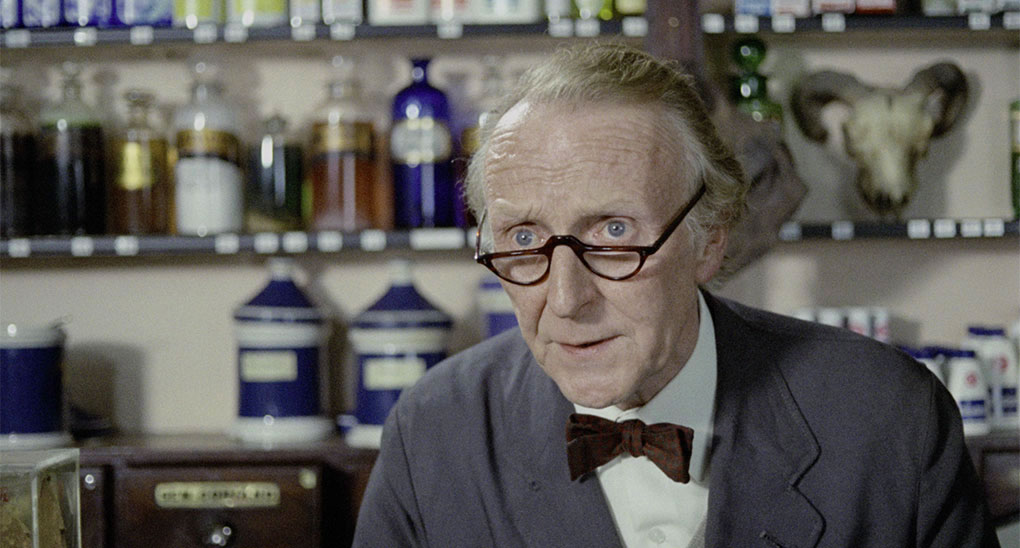
Everything that goes for the Theatrical Cut also goes for the Final Cut, with the exception of the restored footage, which has been drawn from 35mm prints and does not have the richness and vibrance of the negative-sourced material and is usually a tad softer. That said, the early, gauze-softened shots of Howie receiving communion are in excellent shape.
Unsurprisingly, the footage unique to the Director's Cut is the weakest by far, having been sourced from what looks like a standard definition video original, although the quality here does vary somewhat, with Howie's frosty interactions with his fellow policemen in the restored opening noticeably clearer and more stable than the brief shot of him entering the graveyard later. It's certainly worth knowing that this lower quality material is the exception rather than the rule here – aside from the church scene, the whole pre-title sequence and the vast majority of the opening credits (which do differ slightly from those on the Theatrical and Final Cuts) will likely make it look to the unaware as if this version has been sourced entirely from a video original. But stick with it, as the serious jump in quality when the restored 35mm footage kicks in – on pristine close-ups of Edward Woodward piloting the plane and aerial shots of the Summerisle orchards – may well then knock your socks off.
The soundtrack, which I'm presuming has also been restored either for this or the previous Blu-ray release, is presented in Linear PCM 2.0 mono and is in excellent shape. The inevitable restrictions in tonal range are evident but never an issue. The dialogue is always clear, the music sounds splendid, and there are no traces of wear or damage.
Also included is a Linear PCM 2.0 German dub, and as these things go it's not at all bad, being decently performed, with voices reasonably well matched to the characters, and a real attempt made to make it sound acoustically like dialogue delivered on location rather than a studio-based overdub. When Howie introduces himself to Rowan's mother, it's still the very English, "Sergeant Howie, West Highland Police," and the songs have not been re-recorded in German, which does mean that German viewers will miss out on the lyrics, unless…
Optional English subtitles for the deaf and hearing impaired are available, as are the usual Studiocanal double of French and German subtitles. Switching on the latter will fill a gap left by the German dub, as they handily also provide translation of the song lyrics.
DISC 1: THE FINAL CUT
Revisiting the Locations of The Wicker Man (11:50) – Slarek
A short, mildly diverting new featurette in which Robin Hardy's son Dominic takes us on a tour of a few of the key locations in Galloway and Dumfries in which the film was shot. Includes plenty of drone shots and some brief interviews with film-relevant local people and The Wicker Man crew members Gary Carpenter (associate musical director) and Peter Snell (producer), who provide with another take on the Britt Ekland body double story.
The Wicker Man at 50 (10:46) – Slarek
Director Robin Hardy's son Justin asks critics past and present why there is so much Wicker Mania, at least that's what this featurette claims in its opening caption. Hmm. As far as I'm aware, former screenwriter and Monthly Film Bulletin critic David McGillivray is the only interviewee here who accurately ticks the 'critics past and present' box, the other contributors being academics, passionate BFI personnel (Will Fowler and the insanely busy Vic Pratt), and in the case of Dr. William Clayton, simply 'film expert'. Visually, it's not the most attractive of special features here, though is definitely of interest, primarily for McGillivray's open-mouthed recollection of his first viewing ("How are they ever going to release this?" he asked a colleague) and his subsequent championing of the film, and for Dr. Katy Soar's historical breakdown of the various origins of the film's Pagan elements.
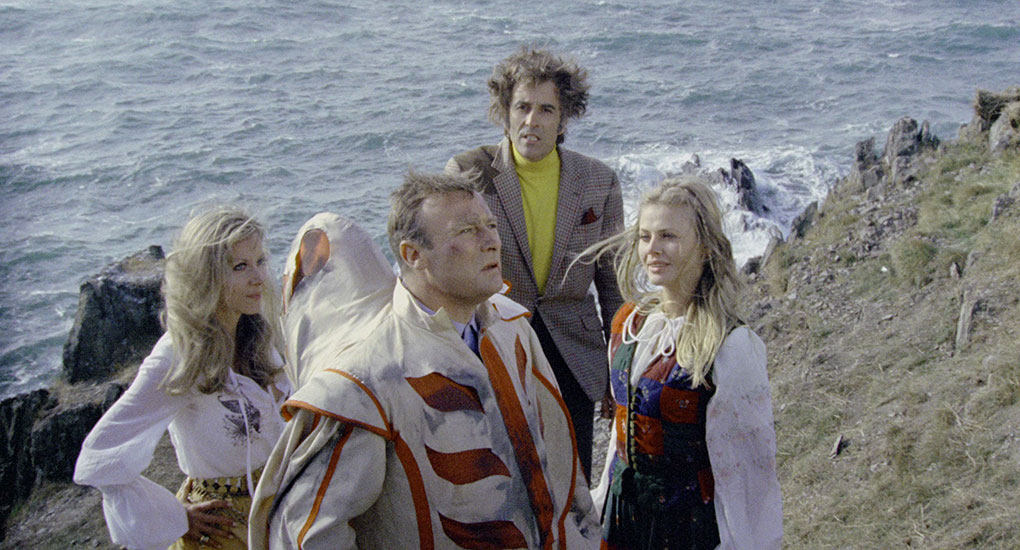
Robin Hardy's Script – The Lost Ending (10:46) – Slarek
Now this is interesting, despite another misleading title – it's not a lost ending but a lost prelude to it. Earlier this year, someone (I'm guessing a family member) unearthed director Robin Hardy's personal copy of Anthony Shaffer's script, which includes a speech made by Lord Summerisle as the film approaches its final scene, one that Hardy clearly decided – if the four lines drawn decisively through it are anything to go by – was simply not needed. Personally, I think he was right. In this featurette, actor/director Tim Plester performs the speech by emulating Christopher Lee basso delivery for Hardy's son Justin, and the two men then speculate on the reasons for Hardy's decision not to film it. A nicely shot and edited piece that I could happily have watched more of, particularly given the many notes that Hardy has written on some of the pages that we only get to briefly glimpse, some of which are optically blurred out for reasons I can only guess at.
Britt Ekland Interview (10:23) – Slarek
A new interview with Swedish actress Britt Ekland, who recalls getting the role, Edward Woodward and Christopher Lee taking their roles very seriously, not getting on with director Robert Hardy, endless walking scenes in the cold, and how scary she found the huge Wicker Man itself. She dismisses a claim made by a local resident on a fan site about her and Woodward being drunk in the mornings, and amused the hell out of me when she says of Lee and the costume he wears in the lead-up to the final scene, "You know that English men love to dress up in women's clothing and wigs."
Stills Gallery (1:04) – Slarek
A rolling gallery of 13 black-and-white behind-the-scenes photos, my favourite being one of Edward Woodward taking a photo whilst dressed as Punch.
Wicker Man Enigma (34:35) – Slarek
A standard definition, 4:3-framed retrospective documentary, directed by David Gregory for a 2001 Blue Underground DVD release, that tells the story of the film's inception, creation, release, reception, and the attempts to bury it, through interviews with several of the key players in the film's production. Screenwriter Anthony Shaffer and director Robin Hardy outline the process of creating the story and the thinking behind it, particularly their desire to create a horror film the broke with they felt was becoming the tired Hammer model. Christopher Lee reveals that he was approached even before the script was written with the aim of writing a character specifically for him, and later realised that he was part of something extraordinary. Ingrid Pitt admits to being enormously impressed by the script, and believed from an early stage that this was going to be an important work. Edward Woodward recalls reading the film as a melodrama and being surprised when Hardy then announced on set that it was a musical. Art director Seamus Flannery talks about finding the right locations, and in a particularly interesting segment discusses the process of creating a the look of the Wicker Man itself. Producer Peter Snell contributes intermittently but really comes into his own when it comes to his ousting and how the film's fortunes changed with the arrival of new management at British Lion. Christopher Lee chips in here with a recollection of visiting new head honcho Michael Deeley, who told him bluntly that in his view The Wicker Man was one of ten worst films he'd ever seen (the film was given a limited release on a double-bill with Nicolas Roeg's Don't Look Now, another film the new management was apparently unimpressed with). Editor Eric Boyd-Perkins remembers being brought back in by the top brass to cut key scenes in order to shorten the film ("These scenes needed cutting," Hardy admits, then adds, "they didn't need obliterating"), and low-budget maestro Roger Corman recalls being outbid by a big studio for the US release rights to a film he saw as having real potential. There is, inevitably, considerable crossover with the Burnt Offering documentary detailed below, but both are well worth seeing.
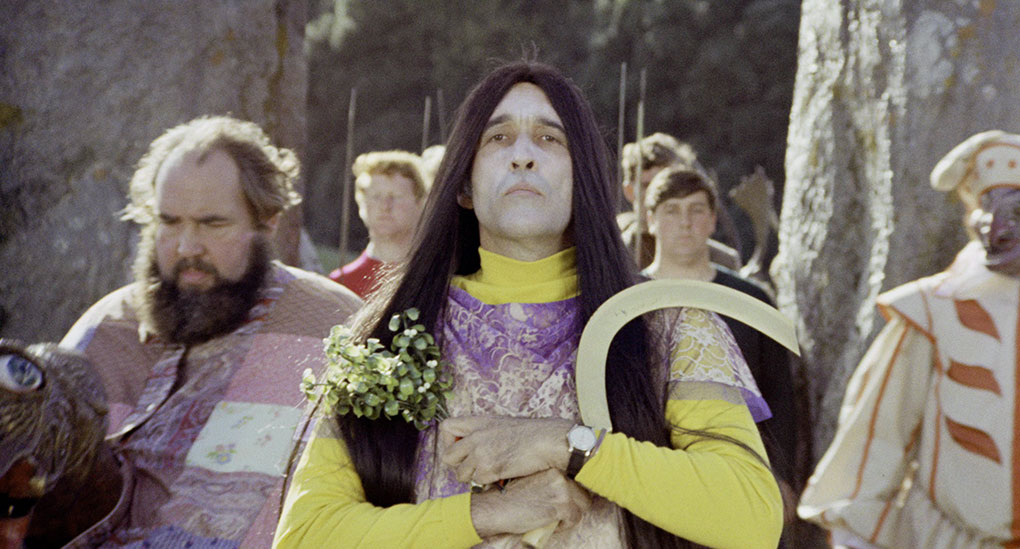
Burnt Offering: The Cult of The Wicker Man (49:05) – Camus
This is the Channel 4 documentary on the film's enduring appeal hosted by Mark Kermode. It features loads of terrific interviews with almost everyone connected with the film. Writer Anthony Shaffer makes a welcome appearance (he has since died). David Pinner is also featured. He is the original author of the book 'Ritual' on which it is believed The Wicker Man based its story, a fact vigorously denied by many of the creative minds on the picture. This documentary is a terrific addition to The Wicker Man myth and comes well recommended.
Worshipping The Wicker Man (22:40) – Camus
Headlined by director Eli Roth and featuring James Watkins, the director of Woman in Black, and Ben Wheatley, director of A Field In England (whose shirt gave the camera operator all sorts of burn out nightmares), this is a fan based interview session, a good natured celebration of The Wicker Man. Roth is particularly pertinent, comparing Al Qaeda with Summerisle and Howie's extremist beliefs. Music and film critic, Frances Morgan's interview has been badly recorded. There is an annoying hum throughout her faint contributions (a small niggle). It's a talking head fest championing the originality of the movie.
The Music of The Wicker Man (15:28) – Camus
Gary Carpenter, Associate Musical Director of the movie, gives us a very detailed history of the genesis of the Paul Giovanni score. Most fascinating to me was the recording technique; close microphone and all voices sung at a half voice. This accounts for the very emotional softness of tone. Jonny Trunk, a film score aficionado, made it his mission to get the score released. Carpenter then oversaw an official stereo release that I believe is the CD commercially available (and possibly Disc 5 in this UHD release).
Interview with Robin Hardy (2013) (16:21) – Camus
A genial catch up interview with a man who describes the genesis of the movie and reminds us that at its heart it is a game, clues of which you pick up as the details go by. Another morsel of intrigue is added to the full nude double affair. Apparently (and at this level of detail, it has to be true, doesn't it?) Ekland said to Hardy "I have an arse like a ski slope..." Hardy adds "It seemed like a perfectly normal backside to me." Lovely.
Interview with Robin Hardy & Christopher Lee (1979) (24:52) – Camus
This is standard definition, what looks like an NTSC VHS recording of a show called 'Critics Choice with Stirling Smith' with guests, Lee and Hardy. Lee has memories of working with Orson Welles and Hardy gives us a genesis of The Wicker Man. The host, Stirling Smith, 'ums' and 'ahs' a fair amount. This is a little off-putting. Uh... uh... Jeez. Scratch that. It is more than off-putting. The programme feels amateurish. To the New Orleans audience for this TV show, Hardy must have sounded like royalty (his accent is cut glass privileged English). The silly Rod Stewart rumour is brought up (Ekland's nudity was apparently a problem for her then beau and the rumour was that the Scottish singer had offered to pay for the film to suppress it). This has since been widely dismissed as bunk.
Final Cut Trailer (1:29) – Slarek
A very smartly edited and seductive sell for the restored release of the Final Cut.
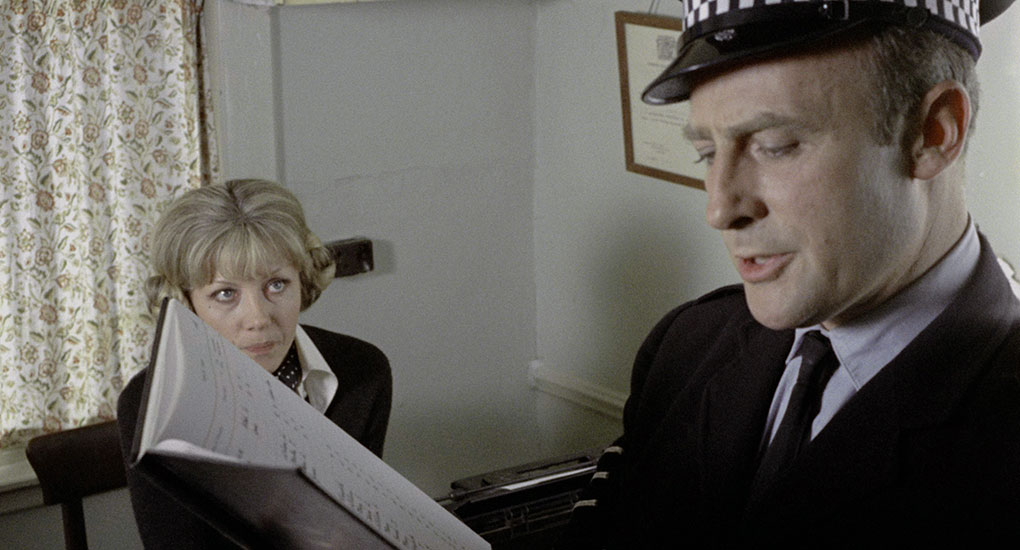
Theatrical Trailer (2:11) – Camus
This artfully constructed trailer starts off with the one music cue that doesn't work in the context of the movie. It's a subliminal frame affair that doesn't give things away as much as suggest them. But it's well cut and would have me asking in 1973 "What was that and when can I see it?" There are three frame inserts of the Wicker Man himself (psychedelic, man) and much repetition but it's intriguing and effective.
DISC 2: THE DIRECTOR'S CUT & THE THEATRICAL CUT
Audio Commentary with Robin Hardy, Christopher Lee and Edward Woodward on The Director's Cut – Camus
Direct from the December 2001 recording, we have the director, both male stars and Observer film reviewer Mark Kermode (who had just taken up the role when the previous Blu-ray edition was released and has, with eerie timing, just announced his retirement from it) officiating. It's a sometimes longwinded affair but always entertaining. You get the sense that Christopher Lee is used to holding court. One of his anecdotes is undercut by Woodward who gets the wrong end of the stick but Kermode does an excellent job in keeping three older film stalwarts on the literal right track. I learned that the members of the copulating group on the lawn outside the Green Man pub were all students from the Bristol Old Vic (I love minutiae like that). Hardy mentions that Britt Ekland specifically asked for a body double for the full Monty shots and in the interview in Burnt Offerings, she contradicts this by saying that Hardy conned her by using one. Truth? Over-rated. Woodward tells us that he warmed his blue-with-cold feet between Ingrid Pitt's lower legs (ah...) but without question, the most surprising thing gleaned from this commentary was the unbelievable fact that Edward Woodward is not Scottish. His accent was so convincing I had no doubt he hailed from the north but no. It was his many years in rep in Scotland that allowed him to perfect the accent and perfect it most certainly is.
Making of the Commentary (15:51) – Camus
Uh... it's a taped version of the audio commentary sessions, an interesting if not hugely relevant addition to the art of recording commentaries for movies.
Also included with the 50th Anniversary 4K UHD Collector's Edition is a 64 Page Booklet with exclusive introduction from Justin and Dominic Hardy plus brand-new essays from Ritual author David Pinner, three Summerisle postcards, two posters, and an EP of Katy J. Pearson and Friends presenting Songs from The Wicker Man, all of which is presented in a really nice looking box, but these were not available for review. As far as we know, none of these additional features is included in the Steelbook Edition.
It's tricky to deliver a definitive decision on this release when you don't have all of the content to judge it by – the soundtrack EP (at least that's what Studiocanal is calling it, but it looks like a CD to me) in particular is something I'd like to have been able to include in our coverage, though as far as I'm aware we've covered all the bases on the Steelbook Edition, if that's the one you opt for. The restoration is terrific and the HDR-enhanced 4K transfer does the film proud, primarily for how wonderfully filmic the image looks at its best. All of the special features from previous Studiocanal and Optimum releases appear to be on board, plus a couple more and a sprinkling of new ones, making this as close as dammit to a definitive release. Despite having the review UHDs, I'm still going to end up buying the Collector's Edition anyway, and if you're as big fan of this film as we all are at Outsider, this has to come highly recommended.
|